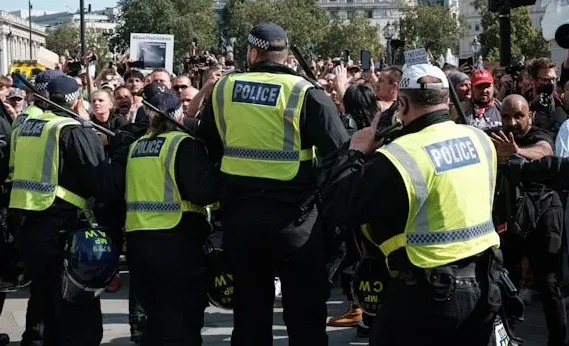Officials say most of the 500+ arrested in London protests will escape prison despite terror law charges
The UK’s largest mass arrest in recent history is unlikely to lead to a wave of prison sentences, despite more than 500 people being detained in London for showing support for the banned group Palestine Action.
Officials believe the “vast majority” of those arrested on Saturday will face fines, community service, or conditional discharges, rather than jail time. The arrests came after demonstrators carried placards and signs expressing support for the proscribed organisation, which was designated as a terrorist group last month.
Justice minister Alex Davies-Jones told the BBC the protesters would “feel the full force” of the law, stressing that “no one is above the law” and pointing to the group’s record of “violent” actions. Under the Terrorism Act, supporting a banned group can carry a prison term of up to 14 years.
However, a senior government official said ministers did not expect the crackdown to “clog up prisons”, noting that it would ultimately be for the courts to decide sentences. Those admitting offences could receive police cautions, avoiding a criminal record.
Overcrowded Prisons and Legal Limits
The decision comes against the backdrop of severe overcrowding in UK prisons. Last summer, the government was forced to release over 1,000 inmates early to free up space. The official stressed that carrying a protest sign was not the same as engaging in financial or operational support for a proscribed group, which attracts harsher penalties.
Repeat offenders, however, could face tougher sentences if found guilty.
Controversy Over Mass Arrest
The arrests – 532 in total – have stirred debate, with almost half of those detained over the age of 60. Many carried handmade signs reading: “I oppose genocide. I support Palestine Action.” Critics argue the enforcement was disproportionate.
Palestine Action, which has been linked to acts of vandalism and sabotage against facilities linked to Israel’s largest arms manufacturer, Elbit Systems, is challenging its terrorist designation in court. While it failed to win interim relief that would allow it to operate, a person familiar with the case said the group had formally disbanded.
Davies-Jones defended the proscription, citing national security reasons that could not be made public, alongside documented actions such as damaging RAF aircraft at the Brize Norton base. She also claimed there were “credible reports” of the group targeting Jewish-owned businesses.
Tim Crosland, a former government lawyer and spokesperson for protest organisers “Defend Our Juries”, dismissed the allegation as “disingenuous”, insisting the group had targeted defence industry facilities.
Rapid Case Processing
Since Palestine Action’s proscription last month, 743 people have been arrested for showing support. The Crown Prosecution Service is working to fast-track the cases, some of which must be reviewed by senior law officers, including the attorney-general, Lord Richard Hermer.
Sources close to the attorney-general’s office said they aim to act “within a matter of hours” upon receiving case files. As of Friday, only three pre-Saturday cases had reached the office.
Prime Minister Sir Keir Starmer’s spokesperson said the Joint Terrorism Analysis Centre had identified three terrorism acts by Palestine Action prior to its ban, though he did not specify details.
A separate pro-Palestinian march, led by a non-proscribed group, also took place in London on Saturday without major incident, drawing thousands of participants.
For those arrested, even without prison sentences, convictions under the Terrorism Act could have lasting consequences — including travel restrictions and limits on employment in certain professions. The question now is whether the government’s hard line on Palestine Action will withstand growing criticism over proportionality and the use of terror laws on peaceful demonstrators.
